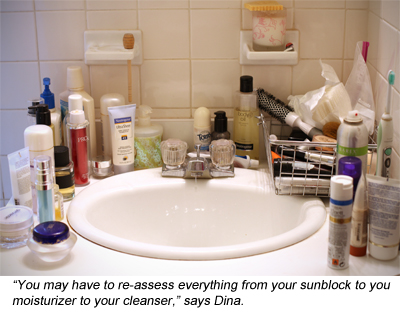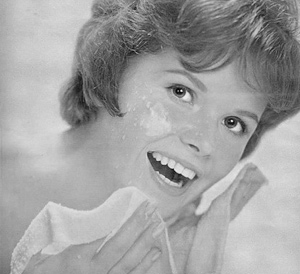If you’ve gone through menopause, it’s time to go through your bathroom vanity. Dr. Dina Anderson, a New York dermatologist in private practice, explains how your skin type changes after fifty, and what you can do about it.
- How does a woman’s skin type change after fifty?
- When you start going through menopause, hormonal fluctuations and hot flashes can really effect the skin. Typically, your skin becomes drier and more sensitive. So it you were oily, you may now be “normal.” If you were normal to dry, you’ll get even drier, and you may start develop sensitivities. If you had sensitive skin, you may develop rosacea-type eruptions due to the hot flashes, or pigmentation problems from the hormone changes.
- How do you know if your skin type has changed?
- You’ll start to notice that your products aren’t working as well. Your cleanser might start to irritate your skin or your moisturizer leaves it feeling dry. You may have to re-assess everything from your sunblock to you moisturizer to your cleanser. The products you use and make all the difference in the world.
- So if you’re reassessing your routine, and you’ve been using products for oily skin, what should you switch to?
- Ones that say “normal” or “normal to oily.” You want to move one step towards dry.
- And if you had dry, sensitive skin, then during menopause, what can you do?
 You want to protect and soothe your skin. Use a very gentle, non–foaming, milky cleanser. La Roche Posay makes an over-the-counter cleanser called Lipikar that I like a lot. A lot of doctors recommend Cetaphil but it has propylene glycol which I’ve noticed can be irritating to my sensitive FOF patients. Choose a moisturizer with antioxidants to protect the skin during the day. I like Active C, also OTC from La Roche POsay.
You want to protect and soothe your skin. Use a very gentle, non–foaming, milky cleanser. La Roche Posay makes an over-the-counter cleanser called Lipikar that I like a lot. A lot of doctors recommend Cetaphil but it has propylene glycol which I’ve noticed can be irritating to my sensitive FOF patients. Choose a moisturizer with antioxidants to protect the skin during the day. I like Active C, also OTC from La Roche POsay.
- What if you want to fight aging, but the anti-aging ingredients are now irritating your newly sensitive, dry skin?
- I like the cream-based moisturizers that contain growth factors–proteins that help promote the cell growth that decreases as we age. I recommend Citrix–made by Topix–which contains a growth factor called TGF Beta. It’s especially good if you have skin that’s still a little oily but also sensitive. Neocutis makes Biocream with a growth factor called PSP that was originally developed for wound healing. It’s a great anti-inflammatory that really calms sensitive skin down.
- You mentioned that women can start developing rosacea-type reactions during this period. What products do you recommend for women struggling with FOF rosacea?
- If you tend to be ruddy and get really flushy and blush, I like a cream called Revale, which contains Coffeeberry extract–a powerful antioxidant–as well as a sunblock.
- Should you use a special sunblock if you’re FOF?
- UVA rays are the ones that cause a lot more damage as far as aging. You have to have a UVA sunblock every day, all through the year. The best blockers for FOF skin are the physical blocks–zinc and titanium–because they don’t have any chemicals so you can’t be reactive. But they’re hard to formulate so they’re elegant. Luckily, a few companies have made really good ones. Tizo has 9% zinc and 4% titanium, and they’re micronized so it doesn’t leave any white residue at all. Plus, it’s tinted, so I have patients who use it as a light foundation. Elta MD is another company that has a whole gamut of inexpensive, quality physical blocks.
 What the biggest mistake you see women making after fifty?
What the biggest mistake you see women making after fifty?
- Using a lot of exfoliating scrubs.When you exfoliate, you disrupt the skin barrier and you’re more likely to be irritated by whatever product you’re using. This is especially true for women using Retinoids. They can cause your skin to peel, so some gentle exfoliation is okay, but never more than twice a week. You’re almost putting holes in the top layers of your skin and then if you use a product with glycolic acid or retinol it’s going to become even more irritating.
- Every doctor says to use retinoids, but if you have this newly sensitive skin, can they be irritating?
- Yes, absolutely. And if that happens, I’d switch to the more antioxidant-based products. Not everyone can tolerate retinoids. I’ll often switch patients Replenix, a cream with retinol, which is less irritating than retinoids, and with antioxidants and hyaluronic acid to seal that barrier better. Or, if they’re using traditional retinoids like retin A, I’ll switch them to twice a week rather than every night.
| Author | |
 |
Dr. Dina Nicole Anderson is a board certified dermatologist in private practice in New York City. She was the Director of Cosmetic Dermatology at SUNY Downstate in Brooklyn, New York from 2001-2005. Dr Anderson has lectured internationally on aging skin, acne and facial rejuvenation techniques. She is on the editorial board of Skin and Aging and Practical Dermatology. |


0 Responses to “Your Skin Has Changed–Have Your Products?”
trish says:
Where do you get all these skin items you are suggesting
What are they?
{Tested} Louis Widmer Remederm Face Cream | Beauty blog says:
[…] your skin becomes drier and more sensitive,” says Dr. Dina Anderson, a New York dermatologist (read more, here). The reps at Louis Widmer, a Swiss skincare company, say they have the solution. Their Remederm […]
{Tested} Louis Widmer Remederm Face Cream says:
[…] your skin becomes drier and more sensitive,” says Dr. Dina Anderson, a New York dermatologist (read more, here). The reps at Louis Widmer, a Swiss skincare company, say they have the solution. Their Remederm […]
marykayburns@yahoo.com says:
i now have acne and can’t get rid of it yuck…what should i do?